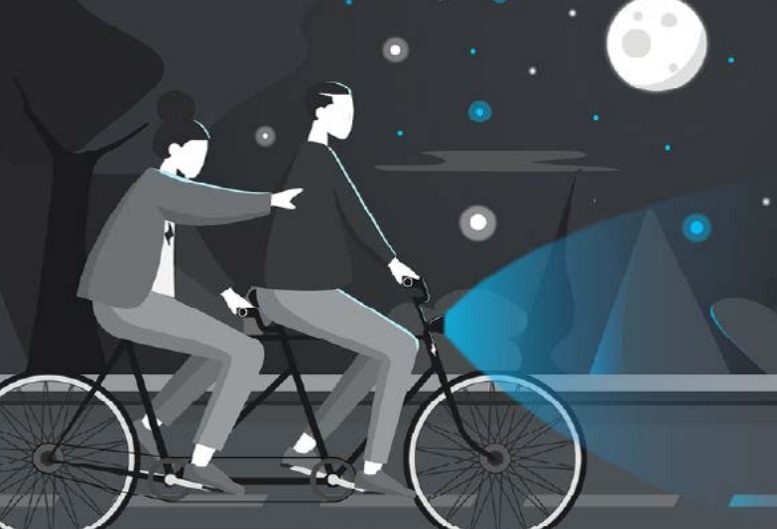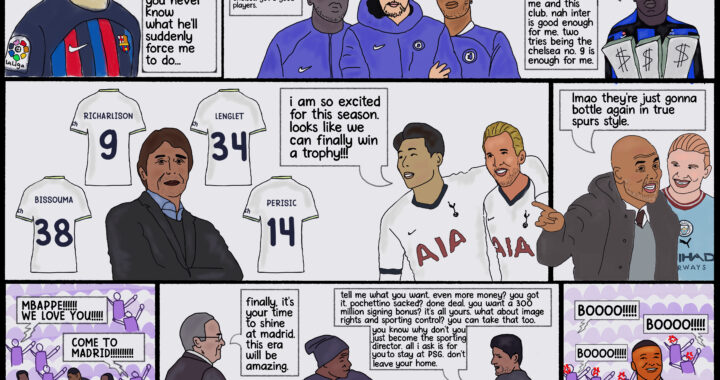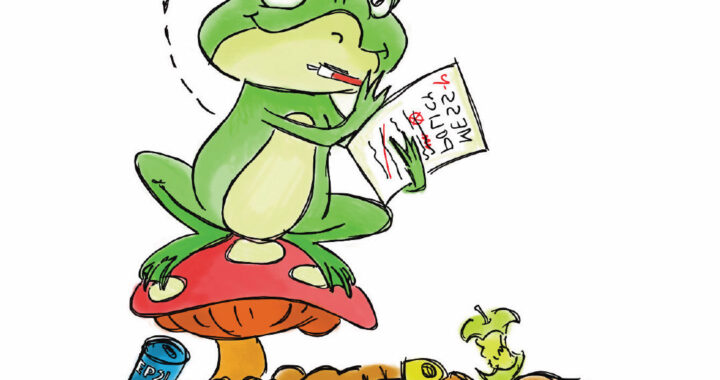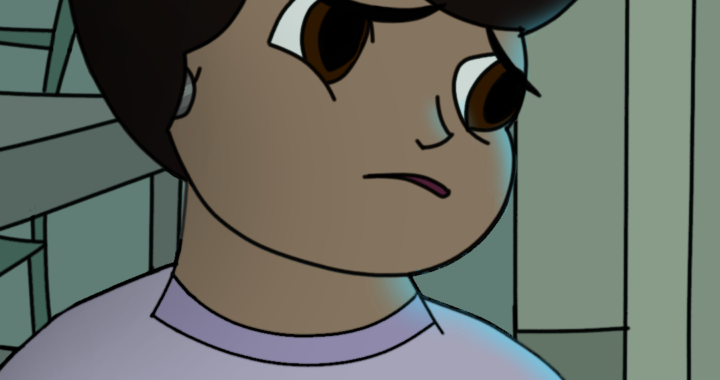What If Online Was The Norm

He was chilling with his parents and brother in the living room. But something was different – something felt weird.
The walls were still blue, the floor still white, the sofa still leather…so what had changed?
The portrait of Charles Babbage on the wall? No, that was still there. Wait…it was different. Duller. Less – well, sparkly, sort of. It looked like it had been made on cloth or paper or one of those rare things. It definitely wasn’t electronic, like it used to be.
And the ceiling – hang on. Were those…plastic stars and planets hanging from the ceiling? It was like the kind of mobiles they used to hang on kids’ cradles, as he’d seen in ancient pictures. Why wasn’t the ceiling showing the sky like it was programmed to?
Everything couldn’t have run out of charge together. What was going on?
“Mom?” he asked. “What’s happening? Where’s all the tech?”
His mother turned around and looked at him. Her skin seemed darker somehow.
“The tech, dear?” she said kindly. “We had to get rid of it all, remember? The virus? Everything’s non-virtual now. How could you have forgotten?”
He couldn’t believe it. Non-virtual? As in…not online? No computers, no phones, no screens? This had to be a nightmare. And not just any nightmare – the worst possible one. He’d have to learn how to enunciate; how to address people; how to convey things using “body language”, whatever that meant; how to write – maybe even in cursive…
X’s eyes flew open. He’d broken into a sweat, lying on his bed. According to the wall clock, it was three in the morning. He had to make sure.
He got out of bed shivering, unable to bear the prospect of a tech-free future. Making his way to the living room, he looked around in the bright light that had come on the second he’d entered.
Thank goodness…the portrait was still electronic, the ceiling was showing the sky. Everything was all right.
X had had the same nightmare every night for over a week now, and it was only getting worse. Maybe it was those news reports about a new pandemic somewhere in the US. But those were just hoaxes, he’d thought. That kind of stuff happened all the time. It blew over eventually. Some of them were nothing more than rumours.
If this was a rumour, though, it was an unnaturally persistent one. It’d been nearly a month, and it hadn’t died out. The others generally fizzled out in two, three weeks at most. This one, on the other hand, seemed to be reporting an oddly – and unnervingly – logical series of events, unlike its far-fetched predecessors.
But come on. Even the president of the US was saying there was nothing to worry about. How could he be wrong? He had to have all kinds of fact-checkers behind his speeches. People said he was the most powerful man in the world, so how could he mislead the millions reading his speeches and addresses?
Look around you, a tiny voice in his head whispered. Some of his friends’ parents hadn’t been letting them text him, for fear of the computer or phone catching a virus and spreading it to them through the mind-computer channel. Countries near the US were starting to impose barriers on extra-national communication – even emailing. (Seriously, did people still use email? Wow.) He went back to his room, thinking deeply. He wasn’t liking the look of things.
He woke up four hours later, blinking the bright sunlight out of his eyes. His mom was yelling from her room.
“Don’t make me open my mouth again, young man! I text and text and text…no response! Switch on your notifications, for heaven’s sake!”
Picking up his phone, he clicked on the button saying “I’m up, Mom!” in response to her messages. The shouting abruptly ceased. His phone pinged.
“Today’s not a holiday, lazybones! Log in, quick, and I shouldn’t have to say it again!” said the text. Wow, was it only Wednesday? It felt like ten days since Monday.
“I’m up, Mom!” he replied with his left hand, brushing his teeth with the other. He was wondering how his grandparents could have managed, growing up with phones that couldn’t respond to their thoughts or even recognise the context of the messages. Did they really have to type every single letter manually? Just thinking about it made his fingers ache. It was all he could do not to keep the toothbrush from falling out of his hand.
He quickly had a bath and sat down in front of his computer. Opening it, he looked at the icon of the video calling platform, Groups. The habitual three dots on his screen, loading, loading, loading. How slow did that app have to be before they switched to Boost or one of the better ones? The Groups chat was so slow he couldn’t even ask his doubts in class. Sometimes he couldn’t even see the live-streamed explanation the teacher was typing; he could only hear the TTS software reading it out. And he wasn’t used to hearing stuff spoken out loud, so that wasn’t great.
Hold on.
Groups had opened. It had stopped buffering. There was the page showing all his classrooms, the “chat”, “activity” and all the other icons on the left.
Why were there no notifications?
He opened each group one by one. Nothing. No messages, no scheduled classes, nothing. So today was a holiday after all! He closed his computer and got up to go back to bed, because who’d voluntarily wake up at seven in the morning?
“Today’s a holiday,” he texted his father. “I’m going back to sleep.”
His dad sent him a grinning emoji. “I told you you should start reading the news, didn’t I? Open it now, at least. Keep your eyes open for a little while.”
Puzzled, X opened the news. His confusion didn’t last long.
BIGGEST PANDEMIC IN TECHNOLOGICAL HISTORY! the headlines screamed out at him. He felt like his heart had fallen into his stomach. This couldn’t be true. This was just another nightmare. Yeah, that’s all it was – just a nightmare.
Suddenly, his phone pinged. He noticed his finger had touched the screen, sending a message to his dad without realising it.
“It’s no dream, son. It’s a real pandemic. Switch off your phone and come to the living room, now.”
No – not the living room – why did it have to be the living room, of all possible places…
His legs felt like they were made of rubber, but he went.
It was scarily similar to his dream – only the ceiling didn’t have that awful mobile thingy, and the portrait of Babbage was switched off completely. But his family were sitting around and talking to each other. Looking at each others’ faces.
“How long did you keep your computer open, son?” his mom asked. She was still as fair as he remembered, thankfully. But she looked quite nervous.
“Just a couple of minutes.”
“Good. That’s fine,” she exhaled. “Don’t open it again unless you absolutely have to.”
“What? Why? What’s going on?”
He was afraid he knew the answer before his dad said it.
“It’s a pandemic, son. I told you. Computers all over the world are incapacitated, and this one spreads like wildfire. It’s not like your day-to-day malware that the technician gets rid of by twiddling some knobs. It’s a real, deadly virus. And it can be fatal – some computers just die within a week. There’s no telling what could happen if it gets into us, too.”
X collapsed on the sofa. “You have to be kidding. Come on. This is a joke. It can’t be an actual pandemic – that just happens in movies and stuff.”
“I wish you were right, son,” his mom said. “But this is real, and we can’t help it. Sometimes, the computers don’t show any signs of having got the virus, even if they have it. They’re the most dangerous – they convey it to other computers and people, and no one realises. Even if a computer’s switched off, the virus could infect it, but that’s the best shot we have at keeping them, and ourselves, safe. There’s no way to tell; we just can’t use them anymore.” What was that expression his grandparents used to describe sad peoples’ faces? Sombre? That’s what his dad looked like. It kind of resembled the sad emoji, come to think of it.
X suddenly thought of something. “What about school? Exams? College? Y’s job? What… what’s going to happen to everything?”
“Well… school’s decided to have classes physically,” his mother explained. “In person. You’re going to have to go there. Exams, you’ll have to write on paper, I suppose, though they haven’t mentioned it. College – well, hopefully, it’ll blow over by then. The kind of voltages Indian computers run on can’t be good for this thing, it should end quickly here. Besides, our computers have such strong antivirus systems, so it shouldn’t spread very much.” (Spoiler: none of that worked out. The virus embraced both Indian voltage levels and antiviruses heartily.)
“As for my job,” his brother said, “they’re kind of figuring it out. But we’ll probably have to go to the office sometime soon. It can’t be too hard for them to adjust to this – the higher government offices do work physically, even in normal conditions.”
X spent the rest of the day in a daze, roaming around the house. Now he couldn’t use tech, he was lost. What could he do? All his books were on his computer. He didn’t know what to study for anymore. He couldn’t even play Impostor with his friends.
Schools and colleges were having a massive headache trying to shift offline. There was a sudden scramble for real estate, because now entire batches of students had to be accommodated in buildings previously meant only for computers (which don’t use the bathroom, dirty the floors or need fresh air). Support staff had to be called thrice as often as before, and then they demanded a raise, so there was talk of increasing the fees (which wasn’t exactly peanuts earlier). The economy underwent a radical shift; what was later to be called the “housing bubble” went on expanding, with no reduction in sight. Luckily, his school (and the college he eventually joined), with admirable foresight, snagged quite some land and sat on it, so there weren’t many problems.
Three days later, the school sent a message. “School will begin on campus the Monday after next. Kindly purchase stationery and sturdy footwear and arrange for transportation. Exams will take place as scheduled, but on paper.”
Exams on paper? With, like, pens and stuff? Unbelievable. They expected people who’d never so much as seen a real pen in their lives to suddenly pick one up and just start scribbling away?
His parents found a bicycle somewhere for him to ride to school. He spent the next week figuring out how to ride it, getting used to the road signs and bumps, getting to know how to get around the city. It was a lot to take in, and he didn’t enjoy it. Time really did go slow when one wasn’t having fun.
Then it was Monday. The first day of “offline” school. (“Never heard that word before,” he thought. “It’s funny – off-line, opposite of on-line. Huh.”).
He took a wrong turn on the way to school. There were so many cars on the road, it looked smaller than it used to – then he realised that it was, in fact, a different road and that he should have taken the next right turn. He reached school late, panting and out of breath. Why did it have to be so far?
He looked around for his class, 12A. Luckily it was on the ground floor. He walked in and sat down on the closest empty seat, then realised everyone was staring at him. The teacher was looking at him like that red emoji, with the eyebrows drawn together and the corners of the mouth bent down – wait, was she angry?
“What did I do?” he said.
“You’re supposed to say “excuse me, ma’am” before entering,” someone said. “We all did it.”
“Oh. Sorry.”
He got up, his face burning, and went to the door and executed the procedure. The teacher began to teach.
That was the longest day of his life. But when the bell rang at three in the afternoon, and he figured he could finally go home, a strange voice came over the loudspeaker.
“Good afternoon, students. This is your principal speaking.” (Was that really how he sounded?) “This announcement is with regard to your board exams – they will take place on paper, as you know. We will have mock exams to get you acquainted with the new mode. Please remember that this is a huge logistical challenge for the board, so there is a chance your exams will be postponed until things settle down, in the hopes of eventually conducting them online, the way you are used to.”
There is a chance. He didn’t know it at the time, but he would hear those words periodically over the next six months, sometimes weeks apart, sometimes days. The closer he got to the exams, the further they were postponed. Again. And again. And again.
The wait was unbelievable. He’d been preparing for these exams for almost a year and a half. He struggled to keep studying, to keep his motivation afloat. But it only got harder and harder, and not having any tech didn’t help with that.
One by one, though, the various colleges and the board gave in and conducted their exams online. The offline exams were too much to organise, and it was getting ridiculously late. “Set up a firewall or something, your computers will be fine,” they said. But every day, more computers across the country conked out. About three-quarters of the infected computers recovered eventually, but the rest just became scrap metal. Technicians were working 20-hour shifts, struggling to figure out how to treat the infected computers. Antivirus software trials were expedited, but there was no sign of a viable candidate. Every day, more and more people resigned themselves to the fact that this virus was here to stay.
X wrote whichever college’s entrances he had to, taking the risk. Luckily his computer didn’t catch it, but he didn’t do as well as he might have if they’d happened on time.
Despite all that, he got into his dream college. But the fight wasn’t over; cases were only increasing by the day, and there was no end in sight. Even his college seemed to be considering starting on campus.
That was what really freaked him out. Meeting people in person? Making expressions, gestures and whatnot? Socialising without the option of seenzoning? Wow. That was going to be new.
Finally, the opening day of college arrived. There was a week-long induction programme.
He and his to-be-batchmates were herded into huge classrooms, listened to speeches, participated in events – everything for the very first time. They interacted with seniors, met their professors, and so on. It was a surreal experience.
No one knew how to deal with the situation – even the seniors had only experienced college online, after all. But somehow, they managed to create a welcoming atmosphere for the freshers, answering all their doubts, organising meets, and so on.
Classes were terribly hard to get used to, too. When you wanted to ask a doubt, “raising your hand” wasn’t as easy as clicking on a button anymore – you had to actually raise it, and you couldn’t lower it until the teacher finished what they were saying. To say it hurt later would be an understatement. Not to mention the fact that as long as your hand was up, everyone was staring at you, drilling a hole in your head. Unbelievably awkward.
There was always a lingering incompleteness in the air – the jokes in the chat during the class, the crisp accent of a TTS engine, and the ping! of phones when a new friend sent a message were all missing. It just wasn’t the same. However, many people made new friends, enjoyed their classes, or learnt new things, there was always a nagging thought at the back of their minds – “This can’t last. It’ll get back online soon. There’s no other way.” The impermanence was implicit.
The professors dropped only tantalising hints about this supposed eventuality. “Maybe in January,” one of them said. “You’ll be lucky if you can attend your second-year classes online,” said another. These prophecies became the substance of much discussion at the canteen, where students had made it a practice to hang out at night.
It did work out, in the end. The president of the US was voted out of office. The freshers went back to their computers and their phones after a while. But they’d shared something together that none of their seniors or juniors ever had or would, and for years afterwards, they fondly recalled 2200, the year they’d spent offline.
Years later, sitting in his home and working on his computer, X suddenly recalled something his great-grandmother had told him when he was little.
It was a story that she’d heard from her grandfather about something that had happened when he had been a toddler, over a hundred years before.
He remembered how vividly she’d described her grandfather’s and his parents’ world – a world without the kind of tech he’d grown up around, a world where such devices seemed unthinkable. A world where memory was restricted to 16GB; where people had to travel several kilometres every single day to work; where not everyone owned a mobile phone – where people were still getting used to technology. Could that really have been just a hundred years before?
And then there was a pandemic – one that affected humans.
The population had been exploding. People were virtually squeezed together – overcrowded slums, packed cities, and so on. Smoke from vehicles used to blot out the stars at night and give people allergies during the day. Rivers turned from blue to green to brown. Species started disappearing. Meanwhile, tech was only beginning its hold on humanity.
Finally, nature took the situation in hand.
There were a hundred theories about its origin – a rogue government bio-engineered it, it spread from a bat to a human at a market, and so on – each as improbable as the last. But what mattered was that it spread to the whole world in a matter of months. Schools and colleges shut down. Economies collapsed. Everything had to be shifted online, in a world that was built on human contact. Exams were postponed, and when they were finally conducted, their results were delayed. Students without access to tech struggled to adjust to online classes. Entire businesses came to a standstill.
But everything returned to normal eventually – well, whatever was normal back then. X supposed people met their friends on their college campus, started travelling to work every day again, and so on. Boy, that was hard to imagine. 2020 must have been one rollercoaster of a year.
But it got him thinking – that had been more than a hundred years ago. Now the world was online, and adjusting offline was hard, like he knew firsthand. The tables had turned.
They’d got through it, though, just like his great-grandmother’s great-grandparents had. Eventually.
Maybe not so much had changed, after all.
Editor: Shashwat Goel


 Football: The 2022/23 Pre-Season Saga Illustrated
Football: The 2022/23 Pre-Season Saga Illustrated  Not For Long
Not For Long  Cleaning up the Mess?
Cleaning up the Mess?  We Are So Cooked
We Are So Cooked  Qu’ils mangent de la grenouille! (Let Them Eat Frogs!)
Qu’ils mangent de la grenouille! (Let Them Eat Frogs!)
1 thought on “What If Online Was The Norm”
Comments are closed.